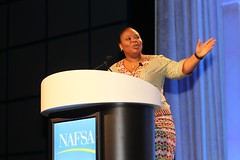 Liberian activist and Nobel Peace Laureate Leymah Gbowee recalled being at a U.S. airport recently and being questioned about why she had a Liberian passport while her child had a U.S. passport.
Liberian activist and Nobel Peace Laureate Leymah Gbowee recalled being at a U.S. airport recently and being questioned about why she had a Liberian passport while her child had a U.S. passport.
She explained she'd had the child while visiting the United States and could not get home in time to give birth. The agent was not kind to her—until she saw something on her passport and realized Gbowee was a recent Nobel Laureate. Then the agent proceeded to apologize profusely. Gbowee reflected that this in no way excused the poor treatment she experienced, and that people should not treat others badly—no matter what nation they call home.
Gbowee shared a number of her experiences and impressions during a recent speech at NAFSA's 2012 Annual Conference & Expo in Houston.
She recalled a young girl who approached her and said that, coming from Africa, she must be impressed by all of the tall buildings in the United States. Gbowee responded to the girl that she was not looking at the buildings, but between the buildings, in the dark alleys to see the truth of what was before her eyes. Like other nations, the United States also has its problems.
Gbowee observed that the United States is "a nation at war"—that we are in a political war among ourselves. She challenged the audience to participate in NAFSA's campaign to write President Obama letters to help young people whose parents brought them into the United States as children without documentation to have an opportunity to pursue an education.
Gbowee is one of three outstanding women leaders who were awarded the 2011 Nobel Peace Prize "for their non-violent struggle for the safety of women and for women's rights to full participation in peace-building work." During Liberia's second civil war, Gbowee worked tirelessly across religious and ethnic lines to organize a peace movement of thousands of women who held nonviolent demonstrations in Monrovia.
To learn more about Leymah Gbowee, look for an in-depth interview that will appear in the September/October 2012 issue of NAFSA's International Educator magazine.
Were you able to attend the plenary? What did you take away from the speech?
